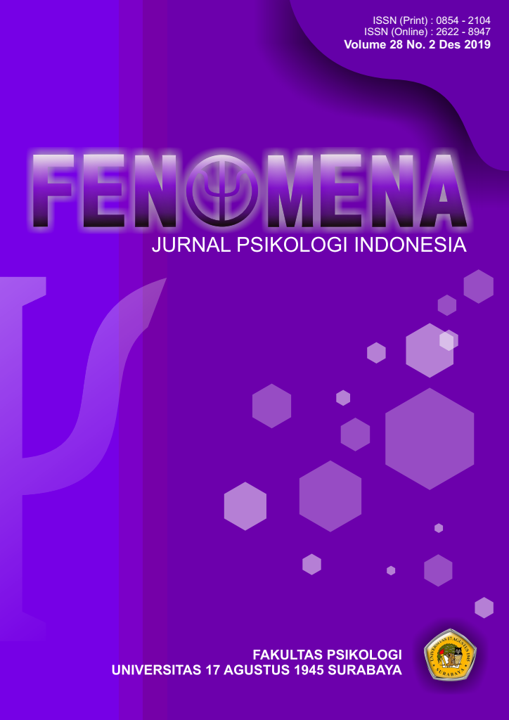Hubungan Religiusitas dan Motivasi menjadi Relawan dengan Perilaku Prososial Anglican Community Center Batam
DOI:
https://doi.org/10.30996/fn.v28i2.2488Abstract
Abstrack
Anglican Community Center Batam is a community of social volunteers who gives their time, energy and funds to help people who are in difficulities. The illegal house (ruli) community of Baloi Kolam Batam is known as a community where the people live in difficulties and have violence, alcoholic, infidelity and low prosocial behaviors. Anglican Community Centre volunteers give assistance through medical programs, food distribution, reading and writing tuition and character education at ruli Baloi Kolam. Everything is given free of charge. The purpose of this study is to determine the correclation of religiosity and motivation to be volunteers with prosocial behavior at Batam's Anglican Community Center volunteers. This study involves 66 volunteers from Batam's Anglican Community Center. The research instrument used is the scale of prosocial behavior, religiosity and motivation to be volunteers. This study uses multiple regression analysis techniques that are processed with the SPSS version 20. The results of the study show (1) religiosity has a very significant correlation with prosocial behavior with a calculated t value of 2.781 and siginification of 0.007 (p<0.01); (2) motivation to be volunteers has a very significant correlation with a value of t count of 3.835 and a significance of 0.000 (p<0.01); (3) religiosity and motivation to be volunteers have a very significant correlation simultaneously with prosocial behavior with a F value of 20.813 and a significance of 0.000 (p<0.01). The implication of this research is that volunteers at Anglican Community Center Batam need to maintain and further improve religiosity as a means to maintain motivation to be volunteers so that they increase their prosocial behavior.
Keywords: Religiosity, Motivation To Be Volunteers and Prosocial Behavior
Downloads
References
Andelina, B., Noor, H., (2015). Hubungan Religiusitas dan Perilaku Prososial pada Relawan KORSA. (Korps Relawan Salman ITB). Prosiding Psikologi Unisba. Pp. 468-475Azwar. (2016). Reliabilitas dan Validitas.Yogyakarta: Pustaka Pelajar.
Baron, R. A. & Byrne, D. (2005). Psikologi Sosial (10th ed.). Jakarta: Erlangga.
Batson, C.D & Brown, T. (1989). Religion personal motivation: Is it altrustic or egoistic? Journal of personality and social Psichology. Vol. 57. No. 5.
Benson, P., Dohority, J., Garman, L., Hanson, E., Hochschwender, M., Lebold, C., Rohr, R., & Sullivan, J. (1980). Interpersonal correlates of vonspontaneous helping behaviour. Journal of Social Psychology, 110, 87-95.
Clary, E., G., Snyder, M., Ridge, R. D., Copeland, J., Stukas, A. A., Haugen, J., & Meine, P. (1998). Understanding and assessing the motivations of volunteers: A functionalapproach. Journal of Personality and Social Psychology, 74, 1516-1530.
Clary, E. G. & Snyder, M. (2002). The motivationsto volunteer: Theoretical and practical considerations. Current Directions in Psychological Science, 8, 156-159.
Dayakisni, Tri & Hudaniah. (2009). Psikologi Sosial. Malang: UMM Press.
Eisenberg, N., Richard A.F., & Tracy, L.S (2006). Prosocial Development. Dalam Damon, W., & Lerner, R.M., (Chief Ed). Dan Eisenberg, N. (vol ed), Handbook of Child Psychology (6th).
Glock, C.Y., & Stark, R. (1970). Religion and Society Intension. San Francisco: Rand McNally.
Hawari, D. (1996). Al-Qur’an: Ilmu Kedokteran Jiwa dan Kesehatan Jiwa. Jakarta: Dana Bhakti Prima Yasa.
Mangunwijaya, Y.B. (1982). Sastra dan Religiositas. Jakarta: Sinar Harapan.
McEwin, M. & Jacobsen-D’Arcy, L. (1992). Essential Volunteer Management. London: Directory of Social Change.
Musick, M. A., & Wilson, J. (2008). Volunteers A Social Profile. Bloomington: Indiana University Press.
Mussen, P. H. Conger, J. J and Kagan, J. (1989). Child Development and Personality (Fifth Edition). Harper and Row Publishers.
Myer, D.D. (1999) Social Psychology (6th-Ed). New York: McGraw_Hill, Inc.
Pinder. C.C. (1984). Work Motivation: Theory, Issues & Aplication. Illinois: Scoff, Foresmen And Company.
Robbins, S. (2008). Perilaku Organisasi, Jilid I dan II, alih Bahasa : Hadyana Pujaatmaja. Jakarta: Prenhallindo.
Sarwono, S.W(2002). Psikologi Sosial. Jakarta: Balai Pustaka
Sarwoto. 1979. Dasar-dasar Organisasi Management. Jakarta: Ghalia Indonesia
Thouless, H. (2000). Pengantar Psikologi Agama. Jakarta: Rajawali Press.
Downloads
Published
Issue
Section
License
Authors retain copyright and grant the journal right of first publication with the work simultaneously licensed under a Creative Commons Attribution 4.0 International License that allows others to share the work with an acknowledgment of the work's authorship and initial publication in this journal.






